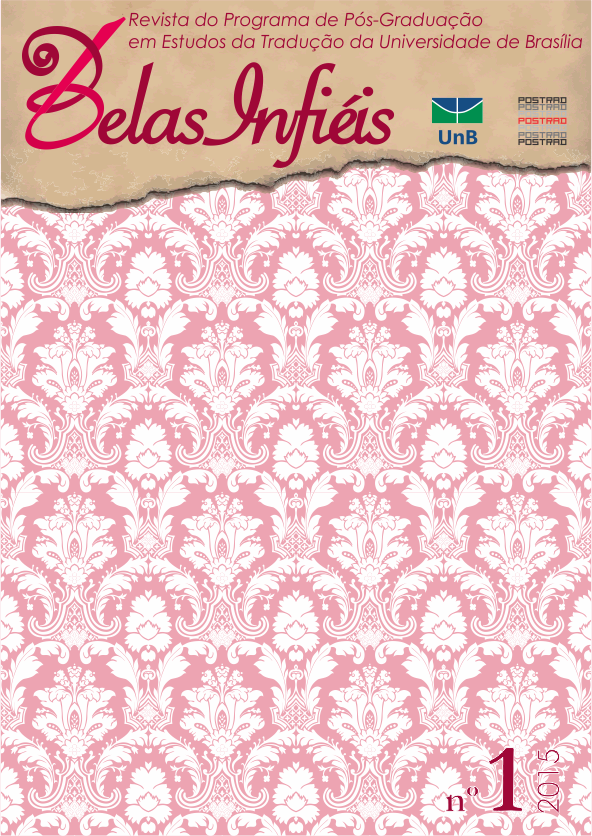TRADUCTION, L'INEVITABLE PRIVATION ANALYSE DES TRADUCTIONS FRANÇAISES DE GRANDE SERTÃO:
VEREDAS DE JOÃO GUIMARÃES ROSA
DOI :
https://doi.org/10.26512/belasinfieis.v4.n1.2015.11321Mots-clés :
processus de standardisation, intraduisibilité, traduction créative, Guimarães Rosa, Antoine BermanRésumé
Cet article a pour but de réaliser une réflexion critique sur le processus de standardisation pratiqué dans des traductions de textes réputés "intraduisibles" par sa charge sémantico-esthétique. Dans ces cas, il appartient au traducteur le rôle de créateur, responsable, quand nécessaire, par l'actualisation de la langue-cible pour qu'elle reçoive ce nouveau texte dans ses diverses dimensions linguistiques. Pour ce faire, j'analyserai les deux traductions françaises de l'oeuvre de João Guimarães Rosa, Grande Sertão: Veredas, sous l'optique de la théorie développée par Antoine Berman.
Téléchargements
Références
Sur la traduction
BERMAN, Antoine. Jacques Amyot, traducteur français, essai sur les origines de la traduction en France. Paris, Belin, 2012.
””””””””””””. La traduction et la lettre ou l’auberge du lointain. Paris, Éditions du Seuil, 1999.
””””””””””””. L’épreuve de l’étranger, culture et traduction dans l’Allemagne romantique. Paris, Gallimard, 1984.
CAMPOS, Haroldo de. Metalinguagem e outras metas. São Paulo, Perspectiva, 1992.
CARELI, Mario, GALVÃO, Walnice Nogueira. Le roman brésilien, une littérature anthropophage au XXe siècle. Paris, Presses universitaires de France, 1995.
CHENIER, Marie-Joseph. Tableau historique de l'état et des progrès de la littérature française depuis 1789. Paris, E. Ducrocq, 1816.
CHEVREL, Yves, D’HULST, Lieven et LOMBEZ, Christine (dir.). Histoire des traductions en langue française XIXe siècle 1815-1914. Paris, Verdier, 2012.
FOLKART, Barbara. Le Conflit des énonciations: Traduction et discours rapporté. Candiac, Québec, Éditions Balzac. 1991.
LADMIRAL, Jean-René. Traduire: théorèmes pour la traduction (1979). Paris, Gallimard, 1994.
OSEKI-DEPRE, Oseki. Théories et pratiques de la traduction littéraire. Paris, Armand Colin, 1999.
MESCHONNIC, Henri. Poétique du traduire. Lagrasse, Verdier, 1999.
_____________. Ethique et politique du traduire. Paris, Verdier, 2007.
ROY, Max. "Du titre littéraire et de ses effets de lecture", Protée, vol. 36, n° 3, 2008, p. 47-56. Disponible sur : <http://id.erudit.org/iderudit/019633ar>. Accès le 5 avril 2015.
TORRES, Marie-Hélène Catherine. Variations sur l’étranger dans les lettres: cent ans de traductions françaises des lettres brésiliennes. Arras, Artois Presses universitaires, collection "Traductologie", 2004.
WEINMANN, Frédéric. "Théories". In: CHEVREL, Yves, D’HULST, Lieven et LOMBEZ, Christine (dir.). Histoire des traductions en langue française XIXe siècle 1815-1914. Paris, Verdier, 2012. pp. 51-148.
Corpus analysé
ROSA, João Guimarães. Grande Sertão: Veredas. Rio de Janeiro, Livraria José Olympio, 1956.
”””””””””””” Diadorim. Traduit du brésilien par Jean-Jacques Villard. Paris, Albin Michel, 1965.
”””””””””””” Diadorim. Traduit du brésilien par Maryvonne Lapouge-Pettorelli. Paris, Albin Michel, 1991.
Téléchargements
Publié-e
Comment citer
Numéro
Rubrique
Licence
Copyright Statement
Given the public access to this journal, the texts are free to use but requires the recognition of the original authorship and initial publication in this journal to be properly stated.
The journal allows the use of works published for non-commercial purposes, including the right to submit the work to publicly accessible databases. Published contributions are the sole and exclusive responsibility of the author(s).
- When submitting papers to be evaluated by the Belas Infiéis journal, the author(s):
- Declare that the contents of the contributions are original and of their original creation, being entirely responsible for their content if there is an objection by third parties.
- Claim to be aware that they should not commit academic plagiarism.
- Declare that the manuscript has not been published, completely or partially, in Portuguese or another language. If it is a translation it should be submitted to the Translated Articles section.
- Declare that the manuscript is not being evaluated by other journals.
- Declare that the manuscript was not submitted to another journal simultaneously.
- Commit(s) to inform the journal of any kind of error or inaccuracy in their contribution (published, in evaluation or in editing) and to collaborate with the editors to make due corrections of the article (when in evaluation or editing) or erratum/retraction (after publication).
- Declare that there is no conflict of interest regarding the published work.
- Authorize its release if it is accepted for publication without any kind of monetary compensation.
- Agree to assign non-exclusive rights to publication to the magazine, remaining free to make their contribution available in other media as long as the publication of the first version in Belas Infiéis magazine is mentioned. They also authorize Belas Infiéis to assign their texts for reproduction in content indexers, virtual libraries and similar platforms.
- Maintain copyright and grant the journal the right of first publication, the work being licensed under theCreative Commons Attribution License.
- Is/Are allowed and encouraged to publish and distribute their work online after the editorial process, which may increase the impact and citation of the published work.
- Authorize the editorial team to make textual adjustments and to adapt the article to the publication rules, when necessary.



















